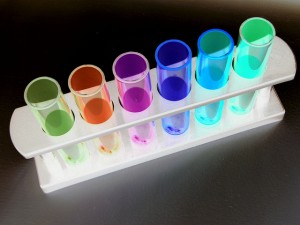
You and I were born in an age shaped by scientific thinking. We find it hard to accept that there might be ways of knowing other than through science — the proof of hypotheses through experimentation.
It is a sort of cultural mythos, this devotion to science. It is a religion without a temple. We spread it like Spackle over ways of knowing that are really not about science at all.
Take my own field of history. Historians talk about scientific approaches to history. Good evidence, well analyzed with sound reasoning, sure — but the past is notoriously unwilling to participate in experiments.
In our post-Enlightenment age, we feel like we will only believe what scientific thinking can support. We want evidence. We want proof.
Then we come to Christianity.
It is very common for people who are not Christian to ask their Christian friends
But how do you know?”
A scientific worldview can seem like an insurmountable obstacle.
I’ll only believe if you can prove it is true.”
Sometimes Christians do a silly thing and say “Just believe!” — as if we became disciples by pretending Christianity were true, jettisoning our intellect and our questions.
No, no, no.
What we have in Christian faith is a different kind of knowing.
On the one hand it is less like science and more like a relationship.
If you asked me
How do you know you have a wife?”
I’d just say you were being silly. I’ve met her. I was there when I married her. I live with her.
I know. No need for proofs.
A Christian is someone who follows Jesus. It is a claim that Jesus is someone we’ve met — somehow. Otherwise we couldn’t follow him. Right?
But there is still another kind of knowing involved.
This is what the Heidelberg Catechism (the classic Reformed summary of biblical Christianity about which I blog my little heart out) has in mind. After talking about Christ as the mediator between us and God it asks
19 Q. How do you come to know this?
A. The holy gospel tells me.
God began to reveal the gospel already in Paradise;
later God proclaimed it by the holy patriarchs and prophets
and foreshadowed it by the sacrifices and other ceremonies of the law;
and finally God fulfilled it through his own beloved Son.
The Catechism says nothing about proving anything. Instead it points us to the ancient writings beloved of God’s people.
We needed God to send us someone to help — and we discover that this is exactly what is both promised and fulfilled in the Scriptures. They spent little energy trying to prove the Bible true. Instead they tried to teach what the Bible’s said — in prophets’ promises, in the shadowy outlines of ancient events and practices, and in crystal clarity once Jesus walks on stage.
In the process, as the Catechism unfolds, it tells our own story in the life of faith:
- By the grace of God’s Spirit we get a glimpse of the comfort and joy God intends for our lives.
- We see the vast difference between our lives and that rich life in God, both because of guilt and because of brokenness.
- We begin to see that we need God to send someone to help us find our way — someone human like us, but someone with God’s own power and love to help us.
And then, as we begin to spend time getting to know the Bible, we come to know that this is exactly what God has promised, and foreshadowed, and provided in Jesus.
————
I’d love to hear from you in the comments. How do YOU know what you know as a Christian?

As I was taking a study break tonight, I read this and was inundated with children’s songs like Jesus Loves Me, and They Will Know We are Christians by Our Love. This lead to another thought…we know from our heart. Science makes us use things like method, logic, empirical theory. But God, Jesus, and the Holy Spirit are all known from our heart. I find it difficult to be in relationship with the sciences, while seeing beauty there, I don’t find expressions of Comforter, Prince of Peace, Everlasting, Advocate in them. But when I think with my heart, and know from my heart, I find all the proof there I need.
Thanks Stuart. When that heart knowledge is true knowledge I think it must be the Spirit’s whisper. (It is, of course, possible to be convinced in the heart other ways by other things, whether they turn out to be true or not.)
How do you know? I agree with your idea that it is by having a relationship with Jesus from learning more about him and his word is How I know. Also, sadly if this sinful, hateful world is all there is to believe in ones life then well, that is just a sad place to be, having a relationship with God and Jesus comes from seeking that relationship and then you will know!